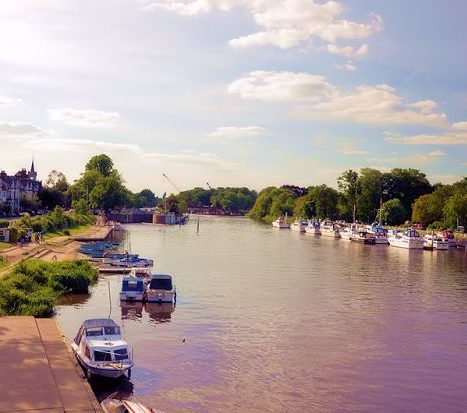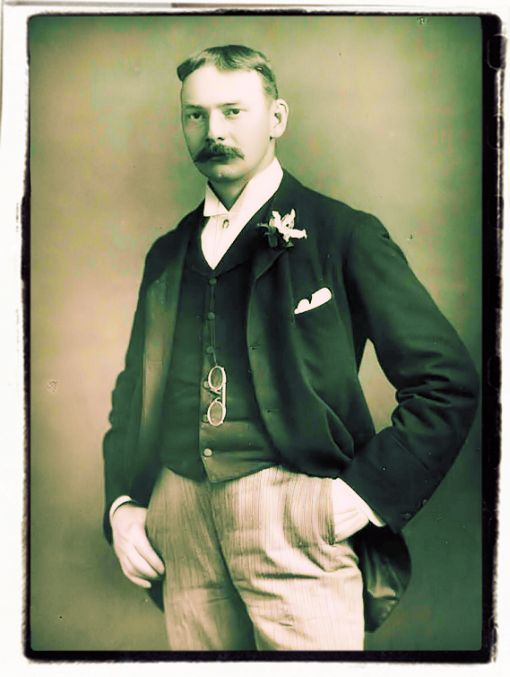
Three men in a boat, the famous and humorous book written by the English author Jerome K. Jerome, an account of a two-week boating holiday on the Thames.
Jerome K. Jerome (1859-1927) wrote the book: Three Men in a Boat (To Say Nothing of the Dog). It is a humorous book about three men (George, Harris and the narrator) and a dog travelling on the river Thames from Kingston upon Thames to Oxford and back to Kingston. Jerome wrote the story after his honeymoon, which he and his wife spent on the River Thames.
The book was initially intended to be a serious travel guide, with accounts of local history along the route, but the humorous elements took over to the point where the serious and somewhat sentimental passages seem a distraction to the comic novel. One of the most praised things about Three Men in a Boat is how undated it appears to modern readers – the jokes have been praised as fresh and witty. Jerome Klapka Jerome was born in 1859. He worked as a teacher, an actor and a journalist. He published Three Men in a Boat in 1889.
Plot. Three friends, George, Harris and the narrator, decide to take a trip along the Thames, taking Montmorency the dog with them. Preparing for the trip is not simple, but after a few disasters (often thanks to the help of Montmorency), the holiday can finally begin. The three men are based on Jerome himself (the narrator Jerome K. Jerome) and two real-life friends, George Wingrave (who would become a senior manager at Barclays Bank) and Carl Hentschel (the founder of a London printing business, called Harris in the book), with whom Jerome often took boating trips. The dog, Montmorency, is entirely fictional but, “as Jerome admits, developed out of that area of inner consciousness which, in all Englishmen, contains an element of the dog”. The trip is a typical boating holiday of the time in a Thames camping skiff.
The Thames is 350 km long, and it’s possibile to rent a fully-equipped boat for a few days and cruise along the river. While cruising, you can stop and visit many historical, cultural and natural sites. For example, Windsor Castle in Windsor, or Forbury Gardens in Reading, close to the ruins of the abbey where Thomas Beckett was consecrated in 1164.
Three Men in a Boat (To say nothing of the Dog)
Preface
The chief beauty of this book lies not, so much in its literary style, or in the extent and usefulness of the information it conveys, as in its simple truthfulness. Its pages form the record of events that really happened. All that has been done is to colour them; and, for this, no extra charge has been made. George and Harris and Montmorency are not Poetic ideals, but things of flesh and blood – especially George, who weighs about twelve stone. Other works may excel this in depth of thought and knowledge of human nature: other books may rival it in originality and size; but, for hopeless and incurable veracity, nothing yet discovered can surpass it. This, more than all its other charms, will, it is felt, make the volume precious in the eye of the earnest reader; and will lend additional weight to the lesson that the story teaches.
Jerome K. Jerome LONDON, August, 1889
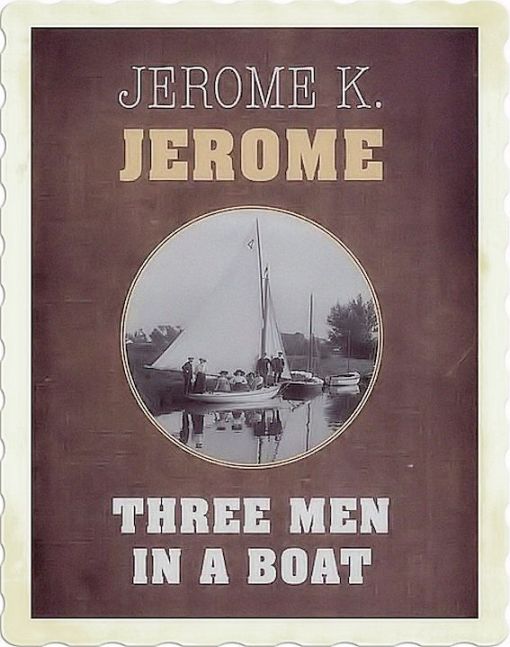
CHAPTER I.
Three Invalids. – Sufferings of George and Harris. – A victim to one hundred and seven fatal maladies. – Useful prescriptions. – Cure for liver complaint in children. – We agree that we are overworked, and need rest. – A week on the rolling deep? – George suggests the river. – Montmorency lodges an objection. – Original motion carried by majority of three to one.
THERE were four of us – George, and William Samuel Harris, and myself, and Montmorency. We were sitting in my room, smoking, and talking about how bad we were – bad from a medical point of view I mean, of course.
We were all feeling seedy, and we were getting quite nervous about it. Harris said he felt such extraordinary fits of giddiness come over him at times, that he hardly knew what he was doing; and then George said that he had fits of giddiness too, and hardly knew what he was doing. With me, it was my liver that was out of order. I knew it was my liver that was out of order, because I had just been reading a patent liver-pill circular, in which were detailed the various symptoms by which a man could tell when his liver was out of order. I had them all.
It is a most extraordinary thing, but I never read a patent medicine advertisement without being impelled to the conclusion that I am suffering from the particular disease therein dealt with in its most virulent form. The diagnosis seems in every case to correspond exactly with all the sensations that I have ever felt.
I remember going to the British Museum one day to read up the treatment for some slight ailment of which I had a touch – hay fever, I fancy it was. I got down the book, and read all I came to read; and then, in an unthinking moment, I idly turned the leaves, and began to indolently study diseases, generally. I forget which was the first distemper I plunged into – some fearful, devastating scourge, I know – and, before I had glanced half down the list of “premonitory symptoms,” it was borne in upon me that I had fairly got it.
I sat for awhile, frozen with horror; and then, in the listlessness of despair, I again turned over the pages. I came to typhoid fever – read the symptoms – discovered that I had typhoid fever, must have had it for months without knowing it – wondered what else I had got; turned up St. Vitus’s Dance – found, as I expected, that I had that too, – began to get interested in my case, and determined to sift it to the bottom, and so started alphabetically – read up ague, and learnt that I was sickening for it, and that the acute stage would commence in about another fortnight. Bright’s disease, I was relieved to find, I had only in a modified form, and, so far as that was concerned, I might live for years. Cholera I had, with severe complications; and diphtheria I seemed to have been born with. I plodded conscientiously through the twenty-six
letters, and the only malady I could conclude I had not got was housemaid’s knee.
I felt rather hurt about this at first; it seemed somehow to be a sort of slight. Why hadn’t I got housemaid’s knee? Why this invidious reservation? After a while, however, less grasping feelings prevailed. I reflected that I had every other known malady in the pharmacology, and I grew less selfish, and determined to do without housemaid’s knee. Gout, in its most malignant stage, it would appear, had seized me without my being aware of it; and zymosis I had evidently been suffering with from boyhood. There were no more diseases after zymosis, so I concluded there was nothing else the matter with me.
I sat and pondered. I thought what an interesting case I must be from a medical point of view, what an acquisition I should be to a class! Students would have no need to “walk the hospitals,” if they had me. I was a hospital in myself. All they need do would be to walk round me, and, after that, take their diploma.
Then I wondered how long I had to live. I tried to examine myself. I felt my pulse. I could not at first feel any pulse at all. Then, all of a sudden, it seemed to start off. I pulled out my watch and timed it. I made it a hundred and forty-seven to the minute. I tried to feel my heart. I could not feel my heart.
It had stopped beating. I have since been induced to come to the opinion that it must have been there all the time, and must have been beating, but I cannot account for it. I patted myself all over my front, from what I call my waist up to my head, and I went a bit round each side, and a little way up the back. But I could not feel or hear anything. I tried to look at my tongue. I stuck it out as far as ever it would go, and I shut one eye, and tried to examine it with the other. I could only see the tip, and the only thing that I could gain from that was to feel more certain than before that I had scarlet fever.
I had walked into that reading-room a happy, healthy man. I crawled out a decrepit wreck.
I went to my medical man. He is an old chum of mine, and feels my pulse, and looks at my tongue, and talks about the weather, all for nothing, when I fancy I’m ill; so I thought I would do him a good turn by going to him now. “What a doctor wants,” I said, “is practice. He shall have me. He will get more practice out of me than out of seventeen hundred of your ordinary, commonplace patients, with only one or two diseases each.” So I went straight up and saw him, and he said: “Well, what’s the matter with you?” I said: “I will not take up your time, dear boy, with telling you what is the matter with me. Life is brief, and you might pass away before I had finished. But I will tell you what is not the matter with me. I have not got housemaid’s knee. Why I have not got housemaid’s knee, I cannot tell you; but the fact remains that I have not got it. Everything else, however, I have got.”…
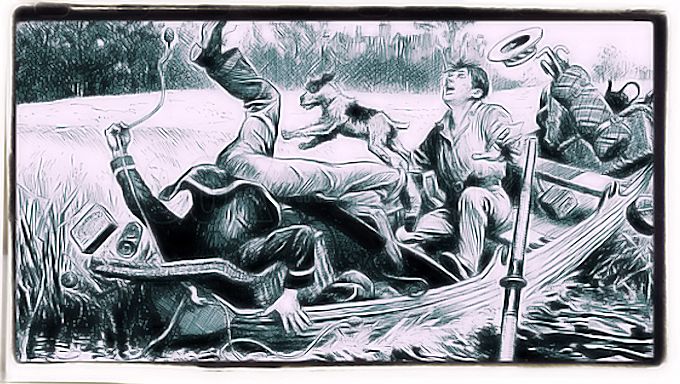
CHAPTER IV
The food question. – Objections to paraffine oil as an atmosphere. – Advantages of cheese as a travelling companion. – A married woman deserts her home. – Further provision for getting upset. – I pack. – Cussedness of tooth-brushes. – George and Harris pack. – Awful behaviour of Montmorency. – We retire to rest.
THEN we discussed the food question. George said: “Begin with breakfast.” (George is so practical.) “Now for breakfast we shall want a frying-pan” – (Harris said it was indigestible; but we merely urged him not to be an ass, and George went on) – “a tea-pot and a kettle, and a methylated spirit stove.”
“No oil,” said George, with a significant look; and Harris and I agreed.
We had taken up an oil-stove once, but “never again.” It had been like living in an oil-shop that week. It oozed. I never saw such a thing as paraffine oil is to ooze. We kept it in the nose of the boat, and, from there, it oozed down to the rudder, impregnating the whole boat and everything in it on its way, and it oozed over the river, and saturated the scenery and spoilt the atmosphere. Sometimes a westerly oily wind blew, and at other times an easterly oily wind, and sometimes it blew a northerly oily wind, and maybe a southerly oily wind; but whether it came from the Arctic snows, or was raised in the waste of the desert sands, it came alike to us laden with the fragrance of paraffine oil.
And that oil oozed up and ruined the sunset; and as for the moonbeams, they positively reeked of paraffine.
We tried to get away from it at Marlow. We left the boat by the bridge, and took a walk through the town to escape it, but it followed us. The whole town was full of oil. We passed through the church-yard, and it seemed as if the people had been buried in oil. The High Street stunk of oil; we wondered how people could live in it. And we walked miles upon miles out Birmingham way; but it was no use, the country was steeped in oil.
At the end of that trip we met together at midnight in a lonely field, under a blasted oak, and took an awful oath (we had been swearing for a whole week about the thing in an ordinary, middle-class way, but this was a swell affair) – an awful oath never to take paraffine oil with us in a boat again – except, of course, in case of sickness.
Therefore, in the present instance, we confined ourselves to methylated spirit. Even that is bad enough. You get methylated pie and methylated cake. But methylated spirit is more wholesome when taken into the system in large quantities than paraffine oil.
For other breakfast things, George suggested eggs and bacon, which were easy to cook, cold meat, tea, bread and butter, and jam. For lunch, he said, we could have biscuits, cold meat, bread and butter, and jam – but no cheese. Cheese, like oil, makes too much of itself. It wants the whole boat to itself. It goes through the hamper, and gives a cheesy flavour to everything else there. You can’t tell whether you are eating apple-pieor German sausage, or strawberries and cream. It all seems cheese. There is too much odour about cheese.
I remember a friend of mine, buying a couple of cheeses at Liverpool. Splendid cheeses they were, ripe and mellow, and with a two hundred horse-power scent about them that might have been warranted to carry three miles, and knock a man over at two hundred yards. I was in Liverpool at the time, and my friend said that if I didn’t mind he would get me to take them back with me to London, as he should not be coming up for a day or two himself, and he did not think the cheeses ought to be kept much longer.
“Oh, with pleasure, dear boy,” I replied, “with pleasure.”
I called for the cheeses, and took them away in a cab. It was a ramshackle affair, dragged along by a knock-kneed, brokenwinded somnambulist, which his owner, in a moment of enthusiasm, during conversation, referred to as a horse. I put the cheeses on the top, and we started off at a shamble that would have done credit to the swiftest steam-roller ever built, and all went merry as a funeral bell, until we turned the corner. There, the wind carried a whiff from the cheeses full on to our steed. It woke him up, and, with a snort of terror, he dashed off at three miles an hour. The wind still blew in his direction, and before we reached the end of the street he was laying himself out at the rate of nearly four miles an hour, leaving the cripples and stout old ladies simply nowhere.
It took two porters as well as the driver to hold him in at the station; and I do not think they would have done it, even then, had not one of the men had the presence of mind to put a handkerchief over his nose, and to light a bit of brown paper.
I took my ticket, and marched proudly up the platform, with my cheeses, the people falling back respectfully on either side. The train was crowded, and I had to get into a carriage where there were already seven other people. One crusty old gentleman objected, but I got in, notwithstanding; and, putting my cheeses upon the rack, squeezed down with a pleasant smile, and said it was a warm day.
A few moments passed, and then the old gentleman began to fidget.
“Very close in here,” he said.
“Quite oppressive,” said the man next him.
And then they both began sniffing, and, at the third sniff, they caught it right on the chest, and rose up without another word and went out. And then a stout lady got up, and said it was disgraceful that a respectable married woman should be harried about in this way, and gathered up a bag and eight parcels and went. The remaining four passengers sat on for a while, until a solemn-looking man in the corner, who, from his dress and general appearance, seemed to belong to the undertaker class, said it put him in mind of dead baby; and the other three passengers tried to get out of the door at the same time, and hurt themselves.
I smiled at the black gentleman, and said I thought we were going to have the carriage to ourselves; and he laughed pleasantly, and said that some people made such a fuss over a little thing. But even he grew strangely depressed after we had started, and so, when we reached Crewe, I asked him to come and have a drink. He accepted, and we forced our way into the buffet, where we yelled, and stamped, and waved our umbrellas for a quarter of an hour; and then a young lady came, and asked us if we wanted anything…
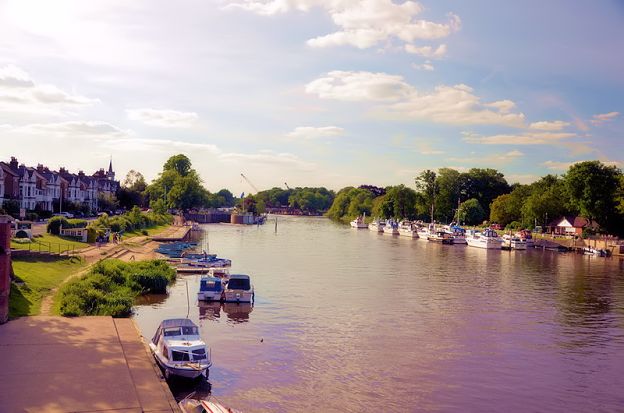
CHAPTER VI.
Kingston. – Instructive remarks on early English history. – Instructive observations on carved oak and life in general. – Sad case of stivvings, junior. – Musings on antiquity. – I forget that I am steering. – Interesting result. – Hampton Court Maze. – Harris as a guide.
It was a glorious morning, late spring or early summer, as you care to take it, when the dainty sheen of grass and leaf is blushing to a deeper green; and the year seems like a fair young maid, trembling with strange, wakening pulses on the brink of womanhood.
The quaint back streets of Kingston, where they came down to the water’s edge, looked quite picturesque in the flashing sunlight, the glinting river with its drifting barges, the wooded towpath, the trim-kept villas on the other side, Harris, in a red and orange blazer, grunting away at the sculls, the distant glimpses of the grey old palace of the Tudors, all made a sunny picture, so bright but calm, so full of life, and yet so peaceful, that, early in the day though it was, I felt myself being dreamily lulled off into a musing fit.
I mused on Kingston, or “Kyningestun,” as it was once called in the days when Saxon “kinges” were crowned there. Great Caesar crossed the river there, and the Roman legions camped upon its sloping uplands. Caesar, like, in later years, Elizabeth, seems to have stopped everywhere: only he was more respectable than good Queen Bess; he didn’t put up at the public-houses.
She was nuts on public-houses, was England’s Virgin Queen. There’s scarcely a pub. of any attractions within ten miles of London that she does not seem to have looked in at, or stopped at, or slept at, some time or other. I wonder now, supposing Harris, say, turned over a new leaf, and became a great and good man, and got to be Prime Minister, and died, if they would put up signs over the public-houses that he had patronised: “Harris had a glass of bitter in this house;” “Harris had two of Scotch cold here in the summer of ’88;” “Harris was chucked from here in December, 1886.”
No, there would be too many of them! It would be the houses that he had never entered that would become famous. “Only house in South London that Harris never had a drink in!” The people would flock to it to see what could have been the matter with it.
How poor weak-minded King Edwy must have hated Kyningestun! The coronation feast had been too much for him. Maybe boar’s head stuffed with sugar-plums did not agree with him (it wouldn’t with me, I know), and he had had enough of sack and mead; so he slipped from the noisy revel to steal a quiet moonlight hour with his beloved Elgiva.
Perhaps, from the casement, standing hand-in-hand, they were watching the calm moonlight on the river, while from the distant halls the boisterous revelry floated in broken bursts of faint-heard din and tumult.
Then brutal Odo and St. Dunstan force their rude way into the quiet room, and hurl coarse insults at the sweet-faced Queen, and drag poor Edwy back to the loud clamour of the drunken brawl.
Years later, to the crash of battle-music, Saxon kings and Saxon revelry were buried side by side, and Kingston’s greatness passed away for a time, to rise once more when Hampton Court became the palace of the Tudors and the Stuarts, and the royal barges strained at their moorings on the river’s bank, and bright-cloaked gallants swaggered down the water-steps to cry: “What Ferry, ho! Gadzooks, gramercy.”
Many of the old houses, round about, speak very plainly of those days when Kingston was a royal borough, and nobles and courtiers lived there, near their King, and the long road to the palace gates was gay all day with clanking steel and prancing palfreys, and rustling silks and velvets, and fair faces. The large and spacious houses, with their oriel, latticed windows, their huge fireplaces, and their gabled roofs, breathe of the days of hose and doublet, of pearl-embroidered stomachers, and complicated oaths. They were upraised in the days “when men knew how to build.” The hard red bricks have only grown more firmly set with time, and their oak stairs do not creak and grunt when you try to go down them quietly.
Speaking of oak staircases reminds me that there is a magnificent carved oak staircase in one of the houses in Kingston. It is a shop now, in the market-place, but it was evidently once the mansion of some great personage. A friend of mine, who lives at Kingston, went in there to buy a hat one day, and, in a thoughtless moment, put his hand in his pocket and paid for it then and there…
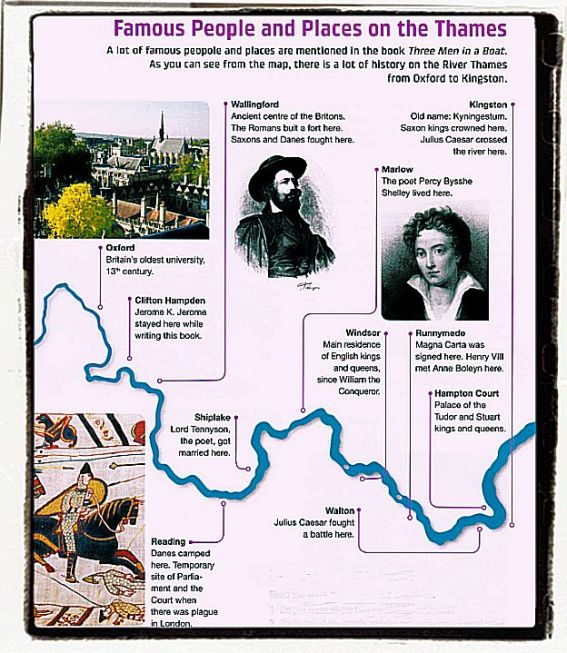
CHAPTER XIV
Which is serious: as becomes a parting chapter – The German from the Anglo-Saxon’s point of view – Providence in buttons and a helmet – Paradise of the helpless idiot – German conscience: its aggressiveness – How they hang in Germany, very possibly – What happens to good Germans when they die? – The military instinct: is it all-sufficient? – The German as a shopkeeper – How he supports life – The New Woman, here as everywhere – What can be said against the Germans, as a people – The Bummel is over and
done.
“ANYBODY could rule this country,” said George; “I could rule it.”
We were seated in the garden of the Kaiser Hof at Bonn, looking down upon the Rhine. It was the last evening of our Bummel; the early morning train would be the beginning of the end.
“I should write down all I wanted the people to do on a piece of paper,” continued George; “get a good firm to print off so many copies, have them posted about the towns and villages; and the thing would be done.”
In the placid, docile German of to-day, whose only ambition appears to be to pay his taxes, and do what he is told to do by those whom it has pleased Providence to place in authority over him, it is difficult, one must confess, to detect any trace of his wild ancestor, to whom individual liberty was as the breath of his nostrils; who appointed his magistrates to advise, but retained the right of execution for the tribe; who followed his chief, but would have scorned to obey him. In Germany to-day one hears a good deal concerning Socialism, but it is a Socialism that would only be despotism under another name. Individualism makes no appeal to the German voter. He is willing, nay, anxious, to be controlled and regulated in all things. He disputes, not government, but the form of it.
The policeman is to him a religion, and, one feels, will always remain so. In England we regard our man in blue as a harmless necessity. By the average citizen he is employed chiefly as a signpost, though in busy quarters of the town he is considered useful for taking old ladies across the road. Beyond feeling thankful to him for these services, I doubt if we take much thought of him. In Germany, on the other hand, he is worshipped as a little god and loved as a guardian angel. To the German child he is a combination of Santa Clans and the Bogie Man. All good things come from him: Spielplätze to play in, furnished with swings and giant-strides, sand heaps to fight around, swimming baths, and fairs. All misbehaviour is punished by him. It is the hope of every well-meaning German boy and girl to please the police. To be smiled at by a policeman makes it conceited. A German child that has been patted on the head by a policeman is not fit to live with; its self-importance is unbearable.
The German citizen is a soldier, and the policeman is his officer. The policeman directs him where in the street to walk, and how fast to walk. At the end of each bridge stands a policeman to tell the German how to cross it. Were there no policeman there, he would probably sit down and wait till the river had passed by. At the railway station the policeman locks him up in the waiting-room, where he can do no harm to himself. When the proper time arrives, he fetches him out and hands him over to the guard of the train, who is only a policeman in another uniform. The guard tells him where to sit in the train, and when to get out, and sees that he does get out. In Germany you take no responsibility upon yourself whatever. Everything is done for you, and done well. You are not supposed to look after yourself; you are not blamed for being incapable of looking after yourself; it is the duty of the German policeman to look after you. That you may be a helpless idiot does not excuse him should anything happen to you. Wherever you are and whatever you are doing you are in his charge, and he takes care of you – good care of you; there is no denying this.
If you lose yourself, he finds you; and if you lose anything belonging to you, he recovers it for you. If you don’t know what you want, he tells you. If you want anything that is good for you to have, he gets it for you. Private lawyers are not needed in Germany. If you want to buy or sell a house or field, the State makes out the conveyance. If you have been swindled, the State takes up the case for you. The State marries you, insures you, will even gamble with you for a trifle.
“You get yourself born,” says the German Government to the German citizen, “we do the rest. Indoors and out of doors, in sickness and in health, in pleasure and in work, we will tell you what to do, and we will see to it that you do it. Don’t you worry yourself about anything.”
And the German doesn’t. Where there is no policeman to be found, he wanders about till he comes to a police notice posted on a wall. This he reads; then he goes and does what it says.
I remember in one German town – I forget which; it is immaterial; the incident could have happened in any – noticing an open gate leading to a garden in which a concert was being given. There was nothing to prevent anyone who chose from walking through that gate, and thus gaining admittance to the concert without paying. In fact, of the two gates quarter of a mile apart it was the more convenient. Yet of the crowds that passed, not one attempted to enter by that gate. They plodded steadily on under a blazing sun to the other gate, at which a man stood to collect the entrance money. I have seen German youngsters stand longingly by the margin of a lonely sheet of ice. They could have skated on that ice for hours, and nobody have been the wiser. The crowd and the police were at the other end, more than half a mile away, and round the corner. Nothing stopped their going on but the knowledge that they ought not. Things such as these make one pause to seriously wonder whether the Teuton be a member of the sinful human family or not. Is it not possible that these placid, gentle folk may in reality be angels, come down to earth for the sake of a glass of beer, which, as they must know, can only in Germany be obtained worth the drinking?…
The German has so long been the soldier of Europe, that the military instinct has entered into his blood. The military virtues he possesses in abundance; but he also suffers from the drawbacks of the military training. It was told me of a German servant, lately released from the barracks, that he was instructed by his master to deliver a letter to a certain house, and to wait there for the answer. The hours passed by, and the man did not return. His master, anxious and surprised, followed. He found the man where he had been sent, the answer in his hand.
He was waiting for further orders. The story sounds exaggerated, but personally I can credit it.
The curious thing is that the same man, who as an individual is as helpless as a child, becomes, the moment he puts on the uniform, an intelligent being, capable of responsibility and initiative. The German can rule others, and be ruled by others, but he cannot rule himself. The cure would appear to be to train every German for an officer, and then put him under himself. It is certain he would order himself about with discretion and judgment, and see to it that he himself obeyed himself with smartness and precision.
For the direction of German character into these channels, the schools, of course, are chiefly responsible. Their everlasting teaching is duty. It is a fine ideal for any people; but before buckling to it, one would wish to have a clear understanding as to what this “duty” is. The German idea of it would appear to be: “blind obedience to everything in buttons.” It is the antithesis of the Anglo-Saxon scheme; but as both the Anglo-Saxon and the Teuton are prospering, there must be good in both methods. Hitherto, the German has had the blessed fortune to be exceptionally well governed; if this continue, it will go well with him. When his troubles will begin will be when by any chance something goes wrong with the governing machine. But maybe his method has the advantage of producing a continuous supply of good governors; it would certainly seem so…
To go on with this amusing book you can also read:

